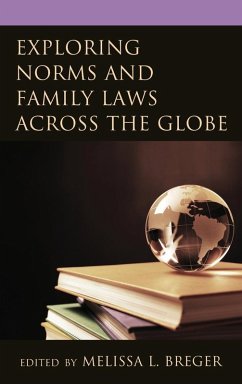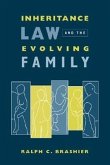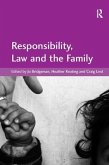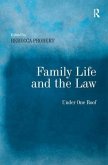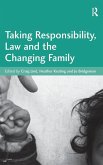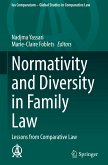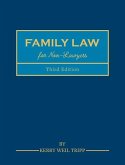Exploring Norms and Family Laws across the Globe
Herausgeber: Breger, Melissa L.
Exploring Norms and Family Laws across the Globe
Herausgeber: Breger, Melissa L.
- Gebundenes Buch
- Merkliste
- Auf die Merkliste
- Bewerten Bewerten
- Teilen
- Produkt teilen
- Produkterinnerung
- Produkterinnerung
By utilizing socio-legal principles as the theoretical underpinnings to each chapter, the contributors offer novel perspectives on how diverse societies across the globe shape family law and ways in which norms within family law may be changed over time.
Andere Kunden interessierten sich auch für
![Inheritance Law and the Evolving Family Inheritance Law and the Evolving Family]() Ralph C. BrashierInheritance Law and the Evolving Family78,99 €
Ralph C. BrashierInheritance Law and the Evolving Family78,99 €![Responsibility, Law and the Family Responsibility, Law and the Family]() Jo BridgemanResponsibility, Law and the Family220,99 €
Jo BridgemanResponsibility, Law and the Family220,99 €![Family Life and the Law Family Life and the Law]() Family Life and the Law210,99 €
Family Life and the Law210,99 €![Taking Responsibility, Law and the Changing Family Taking Responsibility, Law and the Changing Family]() Heather KeatingTaking Responsibility, Law and the Changing Family210,99 €
Heather KeatingTaking Responsibility, Law and the Changing Family210,99 €![Normativity and Diversity in Family Law Normativity and Diversity in Family Law]() Normativity and Diversity in Family Law123,99 €
Normativity and Diversity in Family Law123,99 €![Family Law for Non-Lawyers Family Law for Non-Lawyers]() Kerry Weil TrippFamily Law for Non-Lawyers313,99 €
Kerry Weil TrippFamily Law for Non-Lawyers313,99 €![Family Law and Personal Life Family Law and Personal Life]() EekelaarFamily Law and Personal Life72,99 €
EekelaarFamily Law and Personal Life72,99 €-
-
-
By utilizing socio-legal principles as the theoretical underpinnings to each chapter, the contributors offer novel perspectives on how diverse societies across the globe shape family law and ways in which norms within family law may be changed over time.
Hinweis: Dieser Artikel kann nur an eine deutsche Lieferadresse ausgeliefert werden.
Hinweis: Dieser Artikel kann nur an eine deutsche Lieferadresse ausgeliefert werden.
Produktdetails
- Produktdetails
- Verlag: Lexington Books
- Seitenzahl: 408
- Erscheinungstermin: 28. März 2022
- Englisch
- Abmessung: 235mm x 157mm x 26mm
- Gewicht: 739g
- ISBN-13: 9781793618351
- ISBN-10: 1793618356
- Artikelnr.: 63301190
- Herstellerkennzeichnung
- Libri GmbH
- Europaallee 1
- 36244 Bad Hersfeld
- gpsr@libri.de
- Verlag: Lexington Books
- Seitenzahl: 408
- Erscheinungstermin: 28. März 2022
- Englisch
- Abmessung: 235mm x 157mm x 26mm
- Gewicht: 739g
- ISBN-13: 9781793618351
- ISBN-10: 1793618356
- Artikelnr.: 63301190
- Herstellerkennzeichnung
- Libri GmbH
- Europaallee 1
- 36244 Bad Hersfeld
- gpsr@libri.de
Edited by Melissa L. Breger - Contributions by Victor Asal; Elizabeth Bartholet; Melissa L. Breger; Naomi Cahn; June Carbone; Jessica Lynn Corsi; Michelle Fernando; Josh Gupta-Kagan; Daphna Hacker; Andy Hayward; Mark Henaghan; Sileshi Bedasie Hirko; Fiona
Part I: Intimate Relationships: Examining the Laws and Norms of Adult
Relationships across the
Globe
Chapter 1: Nonmarital Norms by Naomi Cahn and June Carbone
Chapter 2: New Models of Registered Partnership Reform: Embracing Family
Recognition
Beyond Marriage? by Andy Hayward
Chapter 3: Recognition of Islamic Marriages in the UK: Continuity of
Marriage Status or Non-
Existent Marriages? by Michael Wells-Greco
Chapter 4: Norms of Muslim Marriage and Divorce: The Evolution of Algerian
Family Law
Through the Examples of Matrimonial Guardianship and Consent to Marriage by
Nahas
Mahieddin
Part II: Parents: Analyzing Global Norms of Parenting and Their
Intersection with Child Rights
Chapter 5: Establishing New Permanent Family Relationships in United States
and Nordic Child
Protection Systems by Josh Gupta-Kagan
Chapter 6: Separation and Connectedness: Global Norms of Open v. Closed
Adoption by
Malinda Seymore
Chapter 7: Post-Divorce Parental Norms in the Age of Fake News and
Discursive Violence:
Israeli Case in a Comparative Context by Daphna Hacker
Chapter 8: Homeschooling by Elizabeth Bartholet
Part III: Children: Situating the Child within the Legal System and Global
Norms
Chapter 9: Global Norms in the Context of Corporal Punishment against
Children by Melissa L.
Breger, Lucy Sorensen, Victor Asal, and Charmaine N. Willis
Chapter 10: Structural Violence as a Driver of Interpersonal Violence
against Children: Missed
Connections in the Convention on the Rights of the Child and English Law by
Jessica
Lynn Corsi
Chapter 11: Children's Voices in Family Law Proceedings in Australia, the
United Kingdom,
New Zealand and Canada by Michelle Fernando
Chapter 12: Educational Norms as They Relate to Disabled Children across
the Globe by Mark
Henaghan
Part IV: Culture: Comparing the Norms, Themes and Legal Structures of
Family Law across the
Globe
Chapter 13: A Child's Right to Know Their Genetic Origins? A Comparative
Analysis of
Approaches to Donor Linking by Fiona Kelly
Chapter 14: Transgender Family Rights Issues and Concerns: A Comparative
Legal Analysis of
Asia and Europe by Yeshwant Naik
Chapter 15: The Place of Normative Pluralism in the Family Laws: Family and
Marital Union in
Ethiopia by Sileshi Bedasie Hirko
Chapter 16: Imperfect Families: Preserving Family Unity and Communities in
South Africa and
the United States by Deseriee Kennedy
Relationships across the
Globe
Chapter 1: Nonmarital Norms by Naomi Cahn and June Carbone
Chapter 2: New Models of Registered Partnership Reform: Embracing Family
Recognition
Beyond Marriage? by Andy Hayward
Chapter 3: Recognition of Islamic Marriages in the UK: Continuity of
Marriage Status or Non-
Existent Marriages? by Michael Wells-Greco
Chapter 4: Norms of Muslim Marriage and Divorce: The Evolution of Algerian
Family Law
Through the Examples of Matrimonial Guardianship and Consent to Marriage by
Nahas
Mahieddin
Part II: Parents: Analyzing Global Norms of Parenting and Their
Intersection with Child Rights
Chapter 5: Establishing New Permanent Family Relationships in United States
and Nordic Child
Protection Systems by Josh Gupta-Kagan
Chapter 6: Separation and Connectedness: Global Norms of Open v. Closed
Adoption by
Malinda Seymore
Chapter 7: Post-Divorce Parental Norms in the Age of Fake News and
Discursive Violence:
Israeli Case in a Comparative Context by Daphna Hacker
Chapter 8: Homeschooling by Elizabeth Bartholet
Part III: Children: Situating the Child within the Legal System and Global
Norms
Chapter 9: Global Norms in the Context of Corporal Punishment against
Children by Melissa L.
Breger, Lucy Sorensen, Victor Asal, and Charmaine N. Willis
Chapter 10: Structural Violence as a Driver of Interpersonal Violence
against Children: Missed
Connections in the Convention on the Rights of the Child and English Law by
Jessica
Lynn Corsi
Chapter 11: Children's Voices in Family Law Proceedings in Australia, the
United Kingdom,
New Zealand and Canada by Michelle Fernando
Chapter 12: Educational Norms as They Relate to Disabled Children across
the Globe by Mark
Henaghan
Part IV: Culture: Comparing the Norms, Themes and Legal Structures of
Family Law across the
Globe
Chapter 13: A Child's Right to Know Their Genetic Origins? A Comparative
Analysis of
Approaches to Donor Linking by Fiona Kelly
Chapter 14: Transgender Family Rights Issues and Concerns: A Comparative
Legal Analysis of
Asia and Europe by Yeshwant Naik
Chapter 15: The Place of Normative Pluralism in the Family Laws: Family and
Marital Union in
Ethiopia by Sileshi Bedasie Hirko
Chapter 16: Imperfect Families: Preserving Family Unity and Communities in
South Africa and
the United States by Deseriee Kennedy
Part I: Intimate Relationships: Examining the Laws and Norms of Adult
Relationships across the
Globe
Chapter 1: Nonmarital Norms by Naomi Cahn and June Carbone
Chapter 2: New Models of Registered Partnership Reform: Embracing Family
Recognition
Beyond Marriage? by Andy Hayward
Chapter 3: Recognition of Islamic Marriages in the UK: Continuity of
Marriage Status or Non-
Existent Marriages? by Michael Wells-Greco
Chapter 4: Norms of Muslim Marriage and Divorce: The Evolution of Algerian
Family Law
Through the Examples of Matrimonial Guardianship and Consent to Marriage by
Nahas
Mahieddin
Part II: Parents: Analyzing Global Norms of Parenting and Their
Intersection with Child Rights
Chapter 5: Establishing New Permanent Family Relationships in United States
and Nordic Child
Protection Systems by Josh Gupta-Kagan
Chapter 6: Separation and Connectedness: Global Norms of Open v. Closed
Adoption by
Malinda Seymore
Chapter 7: Post-Divorce Parental Norms in the Age of Fake News and
Discursive Violence:
Israeli Case in a Comparative Context by Daphna Hacker
Chapter 8: Homeschooling by Elizabeth Bartholet
Part III: Children: Situating the Child within the Legal System and Global
Norms
Chapter 9: Global Norms in the Context of Corporal Punishment against
Children by Melissa L.
Breger, Lucy Sorensen, Victor Asal, and Charmaine N. Willis
Chapter 10: Structural Violence as a Driver of Interpersonal Violence
against Children: Missed
Connections in the Convention on the Rights of the Child and English Law by
Jessica
Lynn Corsi
Chapter 11: Children's Voices in Family Law Proceedings in Australia, the
United Kingdom,
New Zealand and Canada by Michelle Fernando
Chapter 12: Educational Norms as They Relate to Disabled Children across
the Globe by Mark
Henaghan
Part IV: Culture: Comparing the Norms, Themes and Legal Structures of
Family Law across the
Globe
Chapter 13: A Child's Right to Know Their Genetic Origins? A Comparative
Analysis of
Approaches to Donor Linking by Fiona Kelly
Chapter 14: Transgender Family Rights Issues and Concerns: A Comparative
Legal Analysis of
Asia and Europe by Yeshwant Naik
Chapter 15: The Place of Normative Pluralism in the Family Laws: Family and
Marital Union in
Ethiopia by Sileshi Bedasie Hirko
Chapter 16: Imperfect Families: Preserving Family Unity and Communities in
South Africa and
the United States by Deseriee Kennedy
Relationships across the
Globe
Chapter 1: Nonmarital Norms by Naomi Cahn and June Carbone
Chapter 2: New Models of Registered Partnership Reform: Embracing Family
Recognition
Beyond Marriage? by Andy Hayward
Chapter 3: Recognition of Islamic Marriages in the UK: Continuity of
Marriage Status or Non-
Existent Marriages? by Michael Wells-Greco
Chapter 4: Norms of Muslim Marriage and Divorce: The Evolution of Algerian
Family Law
Through the Examples of Matrimonial Guardianship and Consent to Marriage by
Nahas
Mahieddin
Part II: Parents: Analyzing Global Norms of Parenting and Their
Intersection with Child Rights
Chapter 5: Establishing New Permanent Family Relationships in United States
and Nordic Child
Protection Systems by Josh Gupta-Kagan
Chapter 6: Separation and Connectedness: Global Norms of Open v. Closed
Adoption by
Malinda Seymore
Chapter 7: Post-Divorce Parental Norms in the Age of Fake News and
Discursive Violence:
Israeli Case in a Comparative Context by Daphna Hacker
Chapter 8: Homeschooling by Elizabeth Bartholet
Part III: Children: Situating the Child within the Legal System and Global
Norms
Chapter 9: Global Norms in the Context of Corporal Punishment against
Children by Melissa L.
Breger, Lucy Sorensen, Victor Asal, and Charmaine N. Willis
Chapter 10: Structural Violence as a Driver of Interpersonal Violence
against Children: Missed
Connections in the Convention on the Rights of the Child and English Law by
Jessica
Lynn Corsi
Chapter 11: Children's Voices in Family Law Proceedings in Australia, the
United Kingdom,
New Zealand and Canada by Michelle Fernando
Chapter 12: Educational Norms as They Relate to Disabled Children across
the Globe by Mark
Henaghan
Part IV: Culture: Comparing the Norms, Themes and Legal Structures of
Family Law across the
Globe
Chapter 13: A Child's Right to Know Their Genetic Origins? A Comparative
Analysis of
Approaches to Donor Linking by Fiona Kelly
Chapter 14: Transgender Family Rights Issues and Concerns: A Comparative
Legal Analysis of
Asia and Europe by Yeshwant Naik
Chapter 15: The Place of Normative Pluralism in the Family Laws: Family and
Marital Union in
Ethiopia by Sileshi Bedasie Hirko
Chapter 16: Imperfect Families: Preserving Family Unity and Communities in
South Africa and
the United States by Deseriee Kennedy

